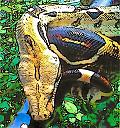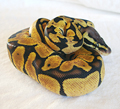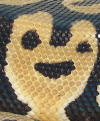» Site Navigation

2 members and 2,829 guests
Most users ever online was 6,337, 01-24-2020 at 04:30 AM.
» Today's Birthdays

» Stats

Members: 75,077
Threads: 248,524
Posts: 2,568,615
Top Poster: JLC (31,651)
|
-
Registered User


 Interesting Article~How are Snakes & Those who own them truly persieved?? Interesting Article~How are Snakes & Those who own them truly persieved??
I came upon an article about snakes and the people who own them and they way the are negatively perceived by soo many. It's nothing new that there are alot of people who are just plain scared of snakes and want nothing to do with them, which is understandable in some cases. On the other hand though what gets me are the number of people I have come into contact with who quickly let me know how much they hate snakes, followed by various negative and rude comments about the kinds of people who own them. When I ask what scares them about snakes or their reason for hating them, I usually do not get a sufficient response. Just today even, to that exact question, the reply was
Quote:
"Eww they are just disgustingly dirty and slimy and carry lots of diseases and are poisonous too. It's those kinds of answers that have become all too familiar to me and more and more common. Those comments clearly show nothing but plain ignorance and intolerance. When I read this article I found it interesting, and worthy of passing it on.
News Article
Your Whole Pet
The Surprising Beauty of Snakes
When you were young, did you ever lie on your belly in a field, watching a bug crawling up a blade of grass? Did you stand perfectly still in a creek, hoping to catch a frog? Did a garter snake ever slither across your bare foot in the backyard, only to be caught in your curious hands? For many of us, our childhoods were filled with wonder at the world of nature, and free of prejudice against things that slither or crawl. But as we grew up, we frequently got the message that while puppies, kittens, and baby bunnies are adorable, cold-blooded critters are something else entirely. I know that happened to me.
But all that changed eight years ago. I started doing some editorial work for a large and well known reptile and amphibian Web site, and had my eyes opened to the beauty of snakes and the motivations of the people who keep them as pets.
Many of the people I met never lost that childhood wonder at the natural world. They would devote endless hours to creating habitats for animals that evolved in environments ranging from the driest deserts to tropical rainforests, sometimes having to learn by trial and error what even the experts didn't know about their snakes. They became obsessive observers of their animals, noting the slightest deviation in activity levels or appetites, their interest and their patience apparently endless.
I also became aware of how much prejudice exists against snakes and the people who keep them. Snakes in our culture have often been relegated to roles as scary monsters in horror flicks and the "ewww gross" segment on nature shows.
I wanted to challenge that view, so I asked some of the Bay Area users of the website if they'd be willing to talk to me for a column.
One of the first to volunteer was Rolf, who keeps a wide variety of pythons and boas and maintains a Web site about their care.
While there's a stereotype of snake owners as anti-social and a little strange, Rolf defies it. When he showed up at San Francisco's Java Beach to meet with me, he was open, friendly, and happy to talk about his animals. Rolf told me that he grew up all over the Northern California coast, mostly in rural areas, where, from the time he was four or five years old, he remembers always being in the middle of a forest, field, or a stream or a creek. "All children look and see things that are interesting, and I always had been involved with these little animals," he said, "You see them. They see you. They go and hide. I can see the rocks and the trees and the water, but I can't see these little bits of life that I know are there.
Where are they going? What are they doing?"
Rolf's parents tolerated his obsession with snakes and even let him keep a captured garter snake in an aquarium for a while. When the snake failed to thrive in his care, however, the boy let it go. Today, he's gotten a lot better at figuring out what his snakes need to be happy and healthy, but he's no less passionate about them.
"I think they're beautiful. I really love just seeing them. But there's also kind of this science-y observation," he said. "I feel like I have a living, breathing part of the rainforest in my apartment. This world that I don't get to see and that most people don't get to see, and it's in my living room.
Marin County's Natalie McNear fits the snake-owner stereotype a bit more. In a phone interview, she described herself as a loner, happiest when by herself in the fields and forests. But simply by being a woman who loves snakes she challenges stereotypes, too.
"I've been going outside and looking for snakes ever since I was a little kid," said the twenty-year-old, who worked at a North Bay reptile store during high school. "I would catch bugs and snakes and everything else that other girls thought were gross.
Her snakes are mostly small natives, including a California kingsnake and a sand boa that she collected herself in the hills around Marin.
Although McNear was at first shy and not given to lengthy responses, that soon changed. Like a light being turned on I could immediately feel and hear how passionate she became when talking about her snake, as a mother would talk of her children. She then began to share with me something that happened just the week before. "I picked up one of my rubber boas, and I thought she had a respiratory tract infection," she told me. "She sounded almost foamy in her lungs.
Her veterinarian examined the snake and said the symptoms were caused by irritation from smoke from the forest fires that broke out all over Northern California this summer. The snake has since fully recovered, but McNear detailed hours spent simply observing the animal.
"A snake that's healthy will look around and flick its tongue really often, whereas a snake that's not doing so well will tend not to do that," she said. "They won't look around. If you hold them they'll be limp and weak.
McNear's quiet observations haven't just been of her snakes; she's noticed a thing or two about how people feel about the animals as well. "(Snakes are) probably one of the most misunderstood animals that people keep as pets," she said "A lot of people are afraid of them.
Fear is behind a lot of prejudice against both snakes and their owners. "People have a slight biological predisposition to be afraid of animals," Rolf said. "I mean, if you step on the wrong one, it can bite you and kill you. So that's in a way a very reasonable fear to have, even though I've never had it. But over the years through media, entertainment, whatnot, there's this kind of mythology built up around these animals, that there are these monstrous constrictors that will kill you and eat you, or get on the school bus and eat your kids.
"Humans have always regarded snakes with a mixture of inquisitiveness and fear, of awe and revulsion," wrote Harry W. Greene, a Cornell University professor of ecology and evolutionary biology, in "Snakes: The Evolution of Mystery in Nature." They "represented healing to the ancient Greeks and knowledge to the Incas; a serpent tempted Eve in the biblical garden of Eden, and a giant cobra shaded Buddha. Snakes run the metaphorical gamut in aboriginal and modern lore, and in the past two decades these limbless creatures have even come into their own as subjects of scientific study.
It's in that last mention that we find the answer to the question of just why we might want to try a little harder not to judge snake lovers, nor discourage our children from an interest in them. Snakes are a vital part of ecosystems on land and in water. They are predator and prey, and have an ancient and still largely unexplored genetic heritage that far predates human history.
Much of what we know about snakes and other small and elusive species comes from the hard work of field biologists like Kate Jackson, the author of "Mean and Lowly Things: Snakes, Science, and Survival in the Congo." Jackson, just like Natalie McNear, was once a little girl lying on her belly in the grass, looking for snakes. Today, she's a biology professor and one of the first herpetologists to slog through the swampy forests of the Northern Congo, studying and cataloguing the reptiles and amphibians she found there.
In her book, a memoir of a year spent running afoul of local customs, language, government and weather in the service of science, Jackson recalls the day she first wondered just why herpetology mattered.
"To a girl mad about reptiles," she wrote, "a herpetology collection needed no more purpose to justify its existence than, say, an art gallery.
" But why did a large institution like the Smithsonian, where she interned, spend so much time and money on its herpetological collection?
The answer her fellow scientists gave her was that they did it to document and protect biodiversity. The importance of that goal seemed obvious to them, and to Jackson. "We loved amphibians and reptiles, and all other animals and plants," she wrote. "We delighted in the thousands of species of each, and agreed that the world would be a sadder place of any were driven to extinction. But that explanation alone made me uneasy. It made species sound like luxury items, to be protected only for aesthetic reasons. I wanted an explanation that would convince a nonscientist - even someone who did not consider snakes irresistibly attractive.
That explanation isn't simple, but it's at the heart of the allure of snake keeping even for people who have never set foot in the jungle or a biology lab - people like Rolf, with his piece of the rainforest.
Nature isn't a simple system, nor is it a single system. It's a universe of interlocking relationships, occupied by so many different species that we humans have described only around 1 percent of them. Remove too many species, or remove a keystone species, and the entire system might collapse, or suffer irreparable harm.
How can we know which those species are, or where the critical mass might be reached, or how those collapsing systems might affect our species? Without the careful, obsessive study of the natural world, we can't. Without encouraging herpetology-crazy little boys and girls who might grow up to be the next Kate Jackson, we never will.
That's because every year, pressured by pollution, development, and other social and political forces, thousands of species cross the threshold of extinction, many without ever having been identified or described at all.
Unless we're motivated by a passion to preserve and save them, how can we ever turn that process around, or even slow it?
Harry Greene opens the final section of "Snakes" with this quotation from Sengalese conservationist Baba Dioum:
In the end, we will conserve only what we love, we will love only what we understand, and we will understand only what we are taught.
My purpose here is not to convince you to love snakes. But I think Dioum is right, that we only save what we care about, and we only care about what we learn to understand.
Every day, hundreds of parents, older sisters and babysitters respond with a shudder and "get that thing out of this house!" when a child shows up with a harmless garden snake in his or her hands.
What if instead we taught ourselves to understand and respect people's interest in snakes and those other "mean and lowly" creatures? Wouldn't doing that not only help kids to retain, but us to reclaim, some of that sense of wonder at the natural world and the desire to preserve it for the future?
Christie Keith is a contributing editor for Universal Press Syndicate's Pet Connection and past director of the Pet Care Forum on America Online. She lives in San Francisco.
-
-
Re: Interesting Article~How are Snakes & Those who own them truly persieved??
Nice article! Do you happen to have a link to it?
-
-
BPnet Veteran


Re: Interesting Article~How are Snakes & Those who own them truly persieved??
Nice article (for once) 
-
-
BPnet Veteran


Re: Interesting Article~How are Snakes & Those who own them truly persieved??
-
-
-
-
Re: Interesting Article~How are Snakes & Those who own them truly persieved??
~ 1.0.0 Python regius ~ Wild-type ~
~ 1.0.0 Canis familiaris ~ Blue Italian Greyhound ~
~ 0.0.9 Danio rerio~ Wild-type and Glofish


-
-
Re: Interesting Article~How are Snakes & Those who own them truly persieved??
I agree whole heartedly that the more people learn to appreciate all animals and nature as a whole, the more we will protect and cherish it.
Great article 
-
-
Registered User


Re: Interesting Article~How are Snakes & Those who own them truly persieved??
 Originally Posted by West Coast Jungle

I agree whole heartedly that the more people learn to appreciate all animals and nature as a whole, the more we will protect and cherish it.
Great article  
Well Said.
-
-
-
-
BPnet Veteran


Re: Interesting Article~How are Snakes & Those who own them truly persieved??
-
 Posting Permissions
Posting Permissions
- You may not post new threads
- You may not post replies
- You may not post attachments
- You may not edit your posts
-
Forum Rules
|








 Reply With Quote
Reply With Quote





 Great article! Thanks for sharing
Great article! Thanks for sharing 











